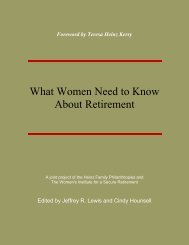What Women Need to Know About Retirement - Wiser
What Women Need to Know About Retirement - Wiser
What Women Need to Know About Retirement - Wiser
Create successful ePaper yourself
Turn your PDF publications into a flip-book with our unique Google optimized e-Paper software.
Visit the WISER (<strong>Women</strong>’s Institute for a Secure <strong>Retirement</strong>) Web site<br />
(www.wiserwomen.org) for more information, including steps you can take <strong>to</strong> establish<br />
and maintain good credit.<br />
4. Assess your insurance needs and buy enough <strong>to</strong> protect yourself. There are four<br />
kinds of insurance every family should have: life insurance, homeowner’s insurance,<br />
health insurance and car insurance.<br />
Life Insurance: When it comes <strong>to</strong> life insurance, it’s essential <strong>to</strong> buy enough <strong>to</strong> cover all<br />
of your debts, like mortgages and student loans, plus 20 percent if you die. The extra 20<br />
percent is a precautionary measure <strong>to</strong> protect your spouse in case there isn’t an<br />
opportunity for employment, there are no other benefits, or any money on the way gets<br />
trapped in red tape. A few dollars more in a monthly premium will buy a lot of breathing<br />
room later.<br />
Life insurance may seem like one of those things you are able <strong>to</strong> do without, but it can<br />
protect you from <strong>to</strong>tal financial ruin if the primary earner in the family is injured or dies.<br />
In addition, if you compare the premium <strong>to</strong> the benefit, it can be fairly cost-effective. If<br />
you’re on a tight budget, avoid whole life policies, which are essentially investment<br />
vehicles, and get term life, which will protect you for a specific number of years while<br />
you’re financially more vulnerable, such as when your children are young. It won’t pay<br />
out a benefit after the term, but it is significantly less expensive than whole life, and by<br />
that time you could be more established financially.<br />
Homeowner’s insurance is another “must have.” Paying the small monthly premium is<br />
nothing compared <strong>to</strong> losing your home and its contents in a fire or other disaster. If<br />
government-subsidized insurance is available, avoid the more expensive private coverage<br />
like flood insurance in coastal areas or near larger rivers, and earthquake insurance in<br />
California.<br />
Health insurance is a problem for many lower-income families. If you cannot afford a<br />
comprehensive plan, consider a catastrophic health insurance policy <strong>to</strong> cover a medical<br />
crisis that could ruin a family budget for years <strong>to</strong> come. For example, having your<br />
appendix taken out can cost $15,000—and there’s no scheduling an appendix attack.<br />
Finally, car insurance is manda<strong>to</strong>ry. If you’re going <strong>to</strong> drive, insure your car. Period. If<br />
you have a homeowner’s policy, you may be able <strong>to</strong> get an umbrella policy covering your<br />
car and your house at a cut rate.<br />
5. Create and agree on a will for you and your spouse or partner. Insurance is there for<br />
the unexpected, but death is a part of life. And as we plan for life, so should we plan for<br />
death. Make sure that wills are drawn up and that you have a notarized original copy, a<br />
lawyer has a copy, and that there’s a copy in a safe deposit box. (If you don’t have a safe<br />
deposit box, consider getting one.) Review and update your will every five years or<br />
when you acquire significant new assets.<br />
While state laws vary, surviving wives usually inherit at least half of their husband’s<br />
estates. However, given the nature of the modern family, inheritance can be contested by<br />
58




